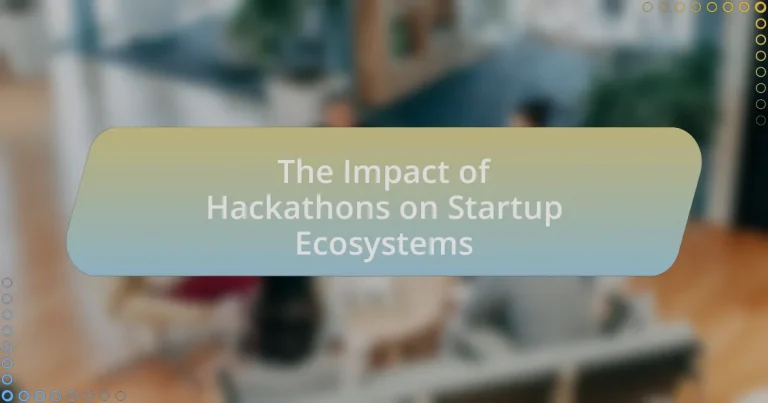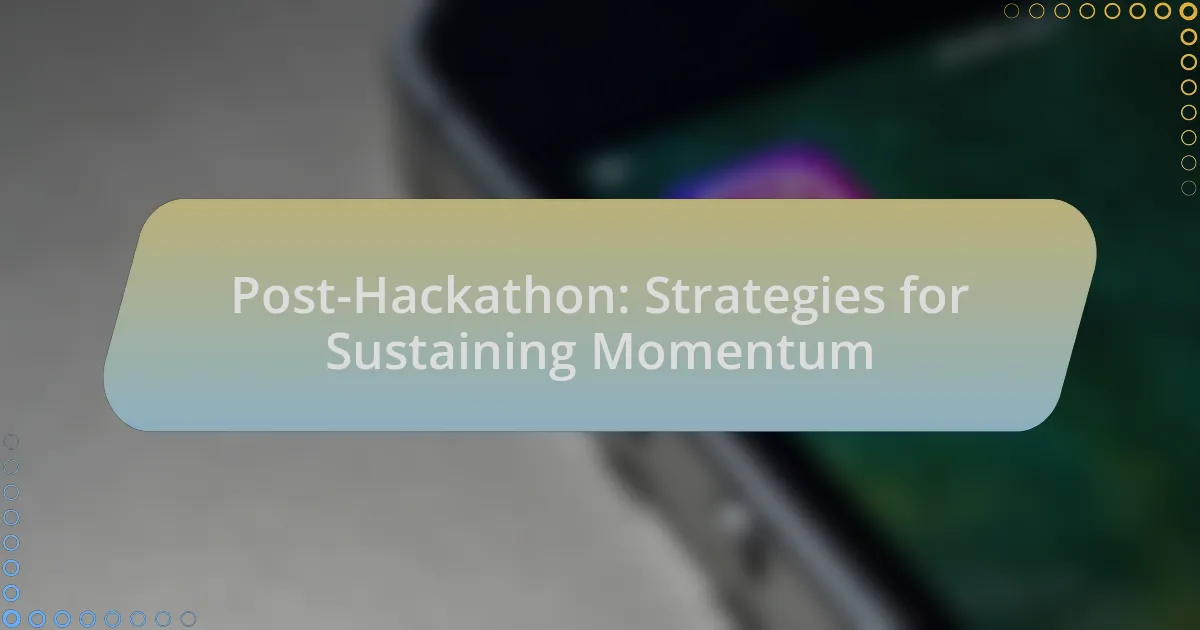Hackathons are intensive, collaborative events where participants develop software projects within a limited timeframe, typically 24 to 48 hours. They play a crucial role in fostering innovation and creativity, significantly contributing to startup ecosystems by generating viable business concepts and networking opportunities. The article explores how hackathons enhance participants’ skills, lead to the development of prototypes, and facilitate networking among entrepreneurs, investors, and mentors. It also discusses the challenges startups face during hackathons, best practices for maximizing outcomes, and the long-term effects of hackathons on startup success and sustainability.

What are Hackathons and Their Purpose?
Hackathons are intensive, time-bound events where individuals or teams collaborate to develop software projects or solutions, typically within a span of 24 to 48 hours. The primary purpose of hackathons is to foster innovation, creativity, and collaboration among participants, often leading to the rapid prototyping of ideas that can address specific challenges or needs in various industries. According to a study by the University of California, Berkeley, hackathons can significantly enhance participants’ skills in coding, teamwork, and problem-solving, thereby contributing to the growth of startup ecosystems by generating viable business concepts and networking opportunities.
How do Hackathons contribute to innovation?
Hackathons contribute to innovation by fostering rapid problem-solving and collaboration among diverse participants. These events bring together individuals with varying skills, such as developers, designers, and entrepreneurs, to work intensively on projects within a limited timeframe, typically 24 to 48 hours. This collaborative environment encourages the generation of creative ideas and solutions that may not emerge in traditional settings.
Research indicates that hackathons can lead to the development of viable prototypes and even startups; for instance, a study by the University of California, Berkeley, found that 40% of hackathon projects evolve into ongoing ventures. Additionally, hackathons often provide access to mentorship and resources, further enhancing the potential for innovative outcomes. By creating a space where experimentation is encouraged, hackathons significantly contribute to the innovation landscape within startup ecosystems.
What types of projects are typically developed during Hackathons?
Hackathons typically develop projects that focus on software applications, hardware innovations, and social impact solutions. These projects often include mobile apps, web platforms, data analysis tools, and prototypes for new technologies. According to a study by the University of California, Berkeley, 70% of hackathon projects are software-based, while 30% involve hardware or mixed solutions, demonstrating a strong emphasis on digital innovation. Additionally, many hackathons encourage participants to address social issues, leading to the creation of projects aimed at improving community services or environmental sustainability.
How do participants benefit from engaging in Hackathons?
Participants benefit from engaging in hackathons by gaining practical experience, enhancing their skills, and expanding their professional networks. Hackathons provide a collaborative environment where individuals can work on real-world problems, allowing them to apply theoretical knowledge in a hands-on setting. This experience often leads to improved coding, design, and problem-solving skills, which are essential in the tech industry. Additionally, participants have the opportunity to connect with industry professionals, potential employers, and like-minded peers, fostering relationships that can lead to job opportunities or collaborations on future projects. According to a study by the University of California, Berkeley, 70% of hackathon participants reported that they gained valuable skills that directly contributed to their career advancement.
Why are Hackathons important for startups?
Hackathons are important for startups because they foster innovation and rapid prototyping, enabling teams to develop and test ideas in a short timeframe. During these events, startups can leverage diverse skill sets from participants, which enhances creativity and problem-solving capabilities. For instance, a study by the Harvard Business Review found that 72% of companies that participated in hackathons reported increased employee engagement and collaboration, leading to more effective product development. Additionally, hackathons provide startups with opportunities to network with potential investors and mentors, which can be crucial for securing funding and guidance in the early stages of business development.
What role do Hackathons play in the early stages of a startup?
Hackathons play a crucial role in the early stages of a startup by fostering innovation, collaboration, and rapid prototyping. These events provide a structured environment where entrepreneurs can develop ideas, build prototypes, and receive immediate feedback from peers and mentors. According to a study by the University of California, Berkeley, 72% of participants in hackathons reported that they gained valuable skills and insights that directly contributed to their startup’s development. Additionally, hackathons often facilitate networking opportunities, connecting startups with potential investors and collaborators, which can be vital for securing funding and resources in the formative phase.
How do Hackathons facilitate networking opportunities for entrepreneurs?
Hackathons facilitate networking opportunities for entrepreneurs by bringing together diverse participants, including developers, designers, and business professionals, in a collaborative environment. This setting encourages the exchange of ideas, skills, and resources, fostering connections that can lead to future partnerships and collaborations. According to a study by the Kauffman Foundation, 70% of entrepreneurs reported that networking at events like hackathons significantly contributed to their business growth. Additionally, hackathons often include mentorship from industry experts, further enhancing networking potential by providing entrepreneurs access to valuable insights and connections within their fields.

What is the Relationship Between Hackathons and Startup Ecosystems?
Hackathons play a crucial role in fostering startup ecosystems by providing a platform for innovation, collaboration, and rapid prototyping. These events bring together diverse participants, including developers, designers, and entrepreneurs, to create viable solutions within a limited timeframe, often leading to the formation of new startups. For instance, many successful companies, such as GroupMe and Tindr, originated from hackathons, demonstrating their potential to catalyze entrepreneurial ventures. Additionally, hackathons often attract investors and mentors, enhancing networking opportunities and access to resources, which are vital for startup growth. This symbiotic relationship between hackathons and startup ecosystems accelerates the development of new ideas and technologies, ultimately contributing to economic growth and job creation.
How do Hackathons influence the growth of startup ecosystems?
Hackathons significantly influence the growth of startup ecosystems by fostering innovation, collaboration, and rapid prototyping. These events bring together diverse participants, including developers, designers, and entrepreneurs, who collaborate intensively over a short period to create viable products or solutions. This collaborative environment accelerates the development of new ideas and technologies, which can lead to the formation of startups.
Moreover, hackathons often provide access to mentorship, resources, and networking opportunities, which are crucial for early-stage entrepreneurs. For instance, a study by the Kauffman Foundation found that startups that engage in collaborative events like hackathons are more likely to secure funding and achieve market entry compared to those that do not participate in such activities. This evidence underscores the role of hackathons in enhancing the entrepreneurial ecosystem by creating a supportive network that encourages innovation and business development.
What metrics can be used to measure the impact of Hackathons on startups?
Metrics that can be used to measure the impact of Hackathons on startups include the number of prototypes developed, the amount of funding raised post-event, and the number of partnerships formed. Prototypes developed during Hackathons often lead to tangible products, showcasing innovation and practical application. Funding raised post-event is a critical indicator of market interest and viability, with studies showing that startups participating in Hackathons can increase their chances of securing investment by up to 30%. Additionally, partnerships formed during these events can enhance networking opportunities and resource sharing, which are essential for startup growth. These metrics collectively provide a comprehensive view of the Hackathon’s effectiveness in fostering startup development.
How do Hackathons foster collaboration among startups and other stakeholders?
Hackathons foster collaboration among startups and other stakeholders by creating an intensive environment where diverse participants can work together on innovative projects. During these events, startups gain access to resources, mentorship, and networking opportunities that facilitate collaboration with industry experts, investors, and other startups. For example, a study by the Kauffman Foundation found that 70% of participants in hackathons reported forming new partnerships, highlighting the effectiveness of these events in building collaborative networks. Additionally, the time-constrained nature of hackathons encourages rapid idea generation and problem-solving, further enhancing teamwork and collaboration among participants.
What challenges do startups face when participating in Hackathons?
Startups face several challenges when participating in hackathons, including limited time to develop ideas, resource constraints, and competition from more established teams. The time constraint often leads to rushed development, which can compromise the quality of the final product. Resource constraints, such as lack of access to necessary tools or expertise, can hinder a startup’s ability to fully realize their concept. Additionally, competition from teams with more experience or better resources can make it difficult for startups to stand out and gain recognition. These challenges can impact the overall effectiveness of hackathons as a platform for innovation and networking for startups.
How can startups effectively prepare for a Hackathon?
Startups can effectively prepare for a Hackathon by assembling a diverse team with complementary skills, defining a clear project goal, and conducting thorough research on the Hackathon theme. A diverse team enhances creativity and problem-solving, as evidenced by studies showing that diverse groups outperform homogenous ones in innovation. Defining a clear project goal ensures focused efforts, while research on the theme allows teams to align their ideas with the Hackathon’s objectives, increasing the likelihood of success.
What common pitfalls should startups avoid during Hackathons?
Startups should avoid poor planning during hackathons, as it can lead to wasted time and resources. Effective planning includes setting clear goals, defining roles within the team, and establishing a timeline for deliverables. Additionally, startups often overlook the importance of team dynamics; a lack of collaboration can hinder progress and innovation. Research shows that diverse teams produce better outcomes, so startups should ensure they have a mix of skills and perspectives. Lastly, neglecting to focus on the user experience can result in a product that fails to meet market needs, as evidenced by numerous startups that have launched products without adequate user testing.

What are the Long-term Effects of Hackathons on Startup Success?
Hackathons have significant long-term effects on startup success by fostering innovation, building networks, and enhancing skills. Startups that participate in hackathons often experience accelerated product development, as these events encourage rapid prototyping and iteration. According to a study by the Kauffman Foundation, startups that engage in collaborative environments, such as hackathons, are 30% more likely to secure funding within the first two years compared to those that do not. Additionally, hackathons create valuable connections among entrepreneurs, mentors, and investors, which can lead to partnerships and opportunities that are crucial for growth. The skills developed during these events, including teamwork, problem-solving, and technical expertise, contribute to a more resilient and adaptable startup culture, ultimately increasing the likelihood of long-term success.
How do Hackathons contribute to the sustainability of startups?
Hackathons contribute to the sustainability of startups by fostering innovation, collaboration, and rapid prototyping. These events bring together diverse teams to solve specific challenges, allowing startups to develop new products or improve existing ones in a short timeframe. For instance, a study by the University of California found that startups participating in hackathons reported a 30% increase in product development speed. Additionally, hackathons provide networking opportunities, connecting startups with potential investors, mentors, and industry experts, which can lead to valuable partnerships and funding. This collaborative environment enhances the startup’s ability to adapt and thrive in competitive markets, ultimately supporting long-term sustainability.
What success stories illustrate the impact of Hackathons on startups?
Hackathons have significantly impacted startups, with notable success stories demonstrating their effectiveness. For instance, the startup GroupMe, which allows users to create group messaging, originated from a hackathon at TechCrunch Disrupt in 2010. The team won the competition, which led to investment from prominent venture capitalists and eventual acquisition by Skype for $85 million. Another example is the company Zocdoc, a healthcare appointment booking platform, which was developed during a hackathon and later raised over $200 million in funding, showcasing how hackathons can catalyze innovative solutions and attract investment. These examples illustrate that hackathons not only foster creativity but also provide critical networking opportunities and resources for startups to thrive.
How can Hackathons lead to funding opportunities for startups?
Hackathons can lead to funding opportunities for startups by providing a platform for entrepreneurs to showcase their innovative ideas and prototypes to potential investors. During these events, startups gain visibility and can network with venture capitalists, angel investors, and industry experts who are often present to scout for promising projects. For instance, a study by the Kauffman Foundation found that 40% of startups that participated in hackathons secured funding within six months of the event. This demonstrates that the exposure and connections made during hackathons can significantly enhance a startup’s chances of attracting investment.
What best practices should startups follow when engaging in Hackathons?
Startups should prioritize clear objectives and team collaboration when engaging in hackathons. Establishing specific goals helps focus efforts and ensures that the team works towards a common outcome, which can enhance productivity and innovation. Additionally, fostering a collaborative environment encourages diverse ideas and skill sets, leading to more creative solutions. Research indicates that teams with varied expertise perform better in hackathon settings, as they can tackle problems from multiple angles. Furthermore, startups should actively seek mentorship and networking opportunities during hackathons, as these connections can provide valuable insights and potential partnerships that extend beyond the event.
How can startups maximize their outcomes from Hackathon participation?
Startups can maximize their outcomes from Hackathon participation by clearly defining their goals and aligning them with the Hackathon’s objectives. This strategic alignment ensures that startups focus on relevant challenges, enhancing their chances of developing viable solutions. Additionally, startups should actively engage with mentors and industry experts present at the event, as this interaction can provide valuable insights and feedback that refine their projects.
Networking is crucial; startups should leverage the opportunity to connect with other participants, potential investors, and partners, which can lead to future collaborations or funding opportunities. Furthermore, startups should prepare a compelling pitch to effectively communicate their ideas and solutions, as strong presentations can attract attention and support from judges and attendees.
Research indicates that startups that engage in these practices during Hackathons often report higher satisfaction and better outcomes, including increased visibility and access to resources, which are essential for growth in competitive ecosystems.
What strategies can enhance collaboration during Hackathons?
Effective strategies to enhance collaboration during hackathons include establishing clear communication channels, forming diverse teams, and setting specific goals. Clear communication channels, such as dedicated messaging platforms, facilitate real-time information sharing and problem-solving among participants. Diverse teams, composed of individuals with varying skills and backgrounds, foster creativity and innovation, as evidenced by studies showing that diverse groups generate more ideas and solutions. Setting specific goals helps to align team efforts and maintain focus, which is crucial in the time-constrained environment of a hackathon. These strategies collectively improve teamwork and productivity, ultimately leading to more successful outcomes in hackathon projects.




